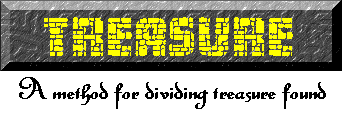

Here are some house rules, which I have been using successfully for quite some time now. They deal with a very touchy subject; a difficult one indeed. One which undoubtedly has, and will continue to cause all manner of difficulty for players and DM's alike.
I have been using, and would like to offer, the system described here for nearly twenty years now. I've been DM'ing/playing D&D/AD&D since 1976, and have been using this method (revised and evolved) with great success ever since. Without further delay...
The basic premise of the method is that all the treasure be reduced to it's monetary value and divided from there. Under most circumstances each player gets an equal share. (If a character was only present for half the adventure then that character should only get a 50% share.)
No actual division of treasure occurs until the end of the current adventure. Players may distribute items during the adventure, so that those who are most capable of using them will be carrying them, but they do not belong to any party member until after the adventure ends and the treasure has been divided according to this method.
Once all items have been appraised, sold, or valued, the total monetary amount is divided equally among all characters.
The total value of all treasures found is 10,000gp. Five characters participated in the adventure. Each character receives an equal share.
Each character receives a 2,000gp share.
Now this does not mean that each character receives 2,000gp. It means each character receives a 2,000gp 'Share'. These shares are then exchanged for goods recovered on a 1 for 1 basis. (1 share = 1 gp)
Character A wishes to keep the +1 dagger worth 500gp.
His share is reduced by 500gp and he gets the dagger. Leaving 1,500 shares. He can then spend his remaining shares on other treasures found, or have it converted to gold.
My campaign makes heavy use of money/coins. Under most circumstances characters are expected to pay for training of all sorts. Level advancement as well as weapon, and non-weapon proficiencies. Even the treasure that adventurers bring back is taxed (lower taxing for properly registered adventuring companies). This method of division evolved as a result of this aspect of my campaign.
In an idyllic Marxist world, all the treasure would be divided in an equitable fashion according to the abilities, and needs of the characters. Greed and desire would not be a factor. I believe that my campaign more accurately reflects reality in this regard. Players/Characters get jealous, zealous, and greedy. They want the best armor, even if it means Wazo the wizards armor class is still 8. Wazo wants the wand of total destruction, even if keeping it would upset the balance of play. This treasure division method has worked well under trying and tested circumstances.
I've tried the 'Whoever needs it most' method, and found it lacking. More specifically it always ends up in player discord/discontent. The more timid players character ends up with very little/few treasure/magic items, and Maghrock the Overlord ends up being all powerful. Not fun for the whole family.
I do not claim that there are no problems with this method; and I have seen plenty of bickering over items that were chosen/picked by more than one player. In the long run however, this method has proven to be fair and equitable. Granted it is a game mechanic, and as such lacks the flavor of role-playing. But the alternative has been, and will continue to be; Cantankerous bickering and squabbling over the 500gp dagger. Should the Wizard or the Thief get the dagger? Who is more likely to use it? But it's the only weapon the Wizard can wield, blah, blah, blah...
The system is well defined
The method which I've detailed can be explained, and examined. There are rules governing the distribution of all treasure. This makes arbitration and dispute resolution simple and less complicated.
The system has built in flexibility.
Money equals shares; Shares equal money. Need more shares for an item? Get some more money.
It provides DM's with some game balance.
If no one in the party can afford the +5 Vorpal Sword, and other characters are unwilling to part with their shares, then the party may have to give up the item; selling the sword in order to provide each character with their fair share.
This keeps over-powered items out of the campaign and insures no one character dominates the group.
If you have questions or comments regarding this method of treasure distribution please feel free to e-Mail me.
Author: Robert L. Vaessen e-mail: ![]()
Last Updated: Wed, Jul 28, 1999 07:32
This page has been accessed times since 15 Nov 1998.